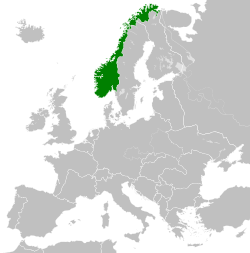Reichskommissariat Norwegen
| Reichskommissariat Norwegen | ||||||||||
| Rikskommissariat Norge | ||||||||||
| Reichskommissariat of Germany | ||||||||||
|
||||||||||
|
||||||||||
|
Reichskommissariat Norwegen in 1942.
|
||||||||||
| Capital | Oslo | |||||||||
| Languages |
Norwegian German |
|||||||||
| Government | Civil administration | |||||||||
| Reichskommissar | ||||||||||
| • | 1940–1945 | Josef Terboven | ||||||||
| • | 1945 | Franz Böhme (acting) | ||||||||
| Historical era | World War II | |||||||||
| • | Terboven appointed | 24 April 1940 | ||||||||
| • | German capitulation | 8 May 1945 | ||||||||
| Area | ||||||||||
| • | 1945 | 323,782 km² (125,013 sq mi) | ||||||||
| Population | ||||||||||
| • | 1945 est. | 3,083,000 | ||||||||
| Density | 9.5 /km² (24.7 /sq mi) | |||||||||
| Currency | Norwegian krone (NOK) | |||||||||
|
||||||||||
The Reichskommissariat Norwegen was the civilian occupation regime set up by Nazi Germany in German-occupied Norway during World War II. Its full title in German was the Reichskommissariat für die besetzten norwegischen Gebiete ("Reich Commissariat for the Occupied Norwegian Territories"). It was governed by Reichskommissar Josef Terboven until his suicide on 7 May 1945. The German military forces in Norway, then under the command of general Franz Böhme, surrendered to the Allied forces on 8 May and the legal government was restored.
The need by Nazi Germany to occupy and incorporate Norway into a German empire came about for two principal reasons. The first was that in 1940, Germany was dependent on natural resources, mainly iron ore, being sent from Sweden to Germany. If Norway allowed Allied vessels to pass through its waters, they could potentially blockade the trade routes. The second reason was that Germany feared an allied attack, either using Norway as a staging area, or moving through Sweden.
Neutrality remained the policy of the Norwegian government until the invasion was a fait accompli. But its highest priority was to avoid a war with the United Kingdom. By the autumn of 1939, there was an increasing sense of urgency that Norway had to prepare, not only to protect its neutrality, but indeed to fight for its "freedom and independence." Efforts to improve military readiness and capability, and to sustain an extended blockade, were intensified between September 1939 and April 1940. Several incidents in Norwegian maritime waters, notably the Altmark incident in Jøssingfjord, put great strains on Norway's ability to assert its (recently broken) neutrality. Norway managed to negotiate favorable trade treaties both with the United Kingdom and Germany under these conditions, but it became increasingly clear that both countries had a strategic interest in denying the other access to Norway.
...
Wikipedia



